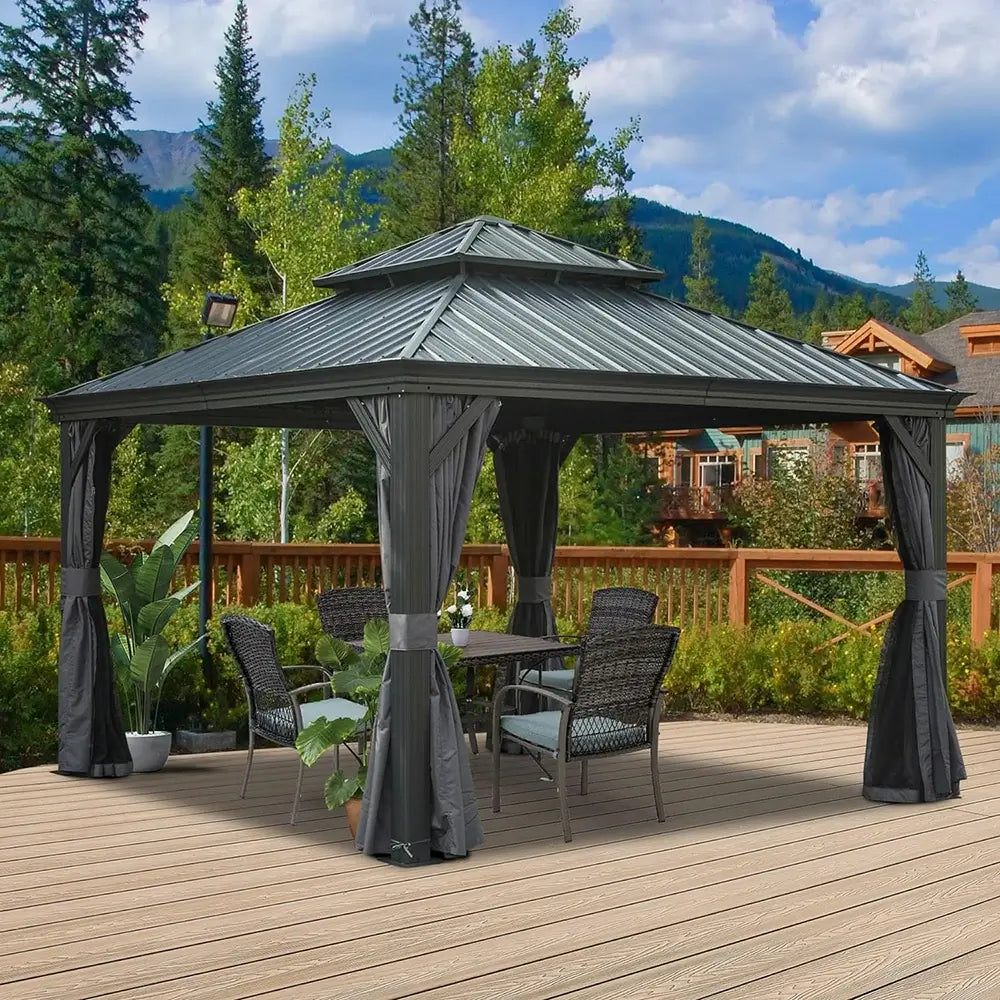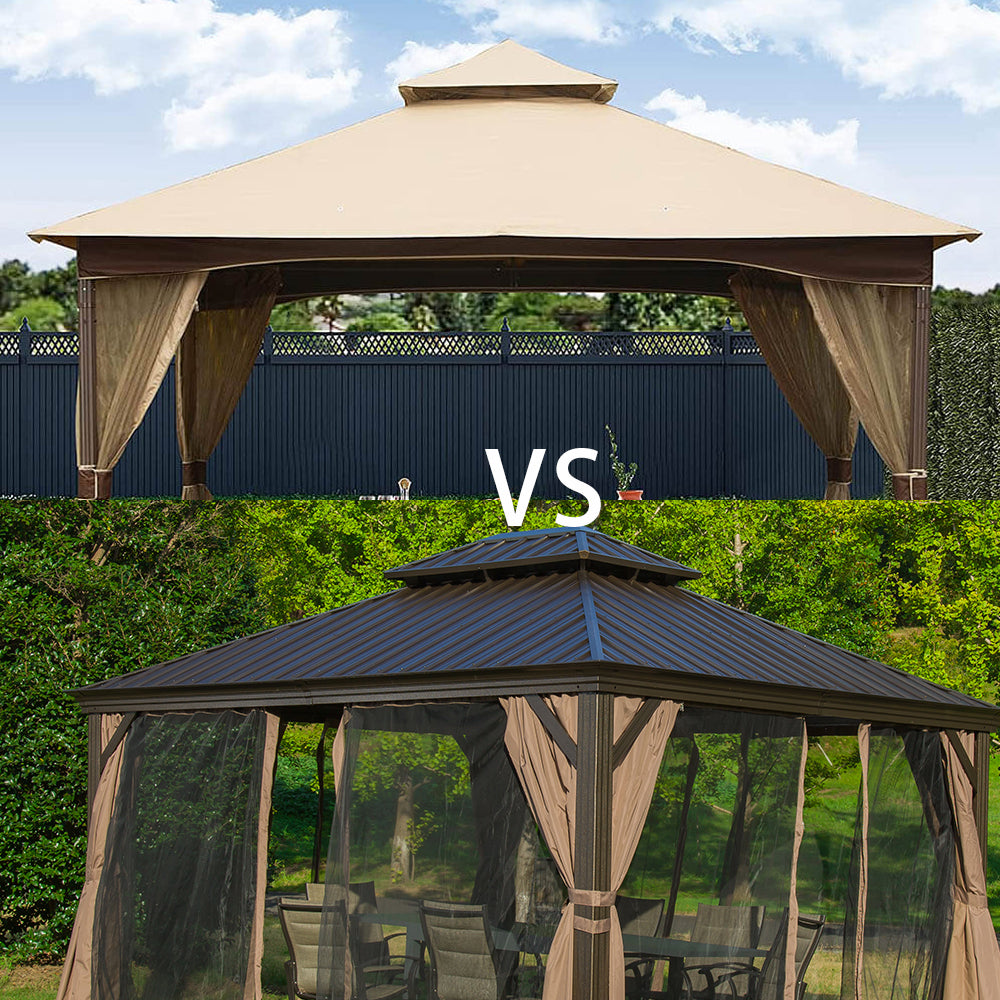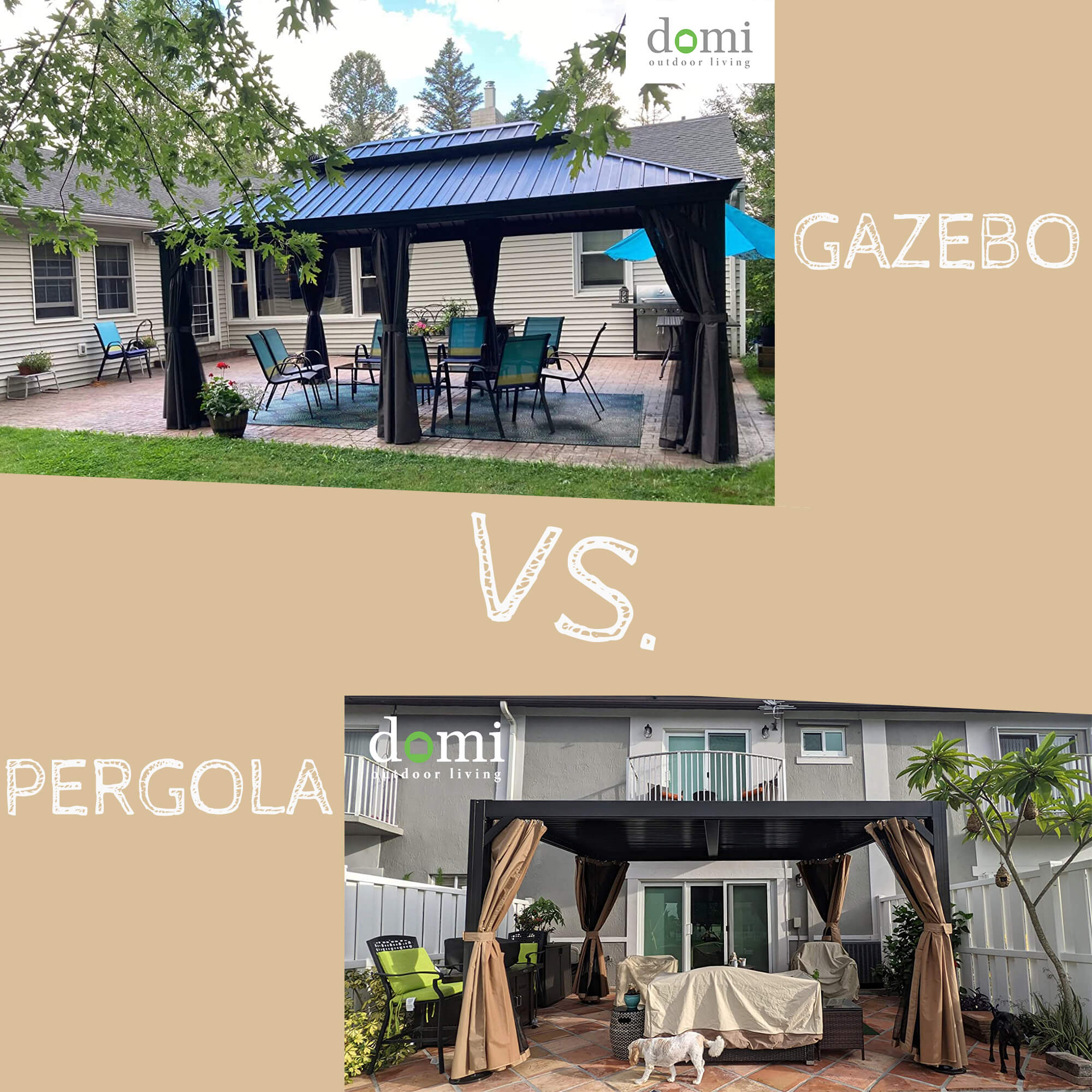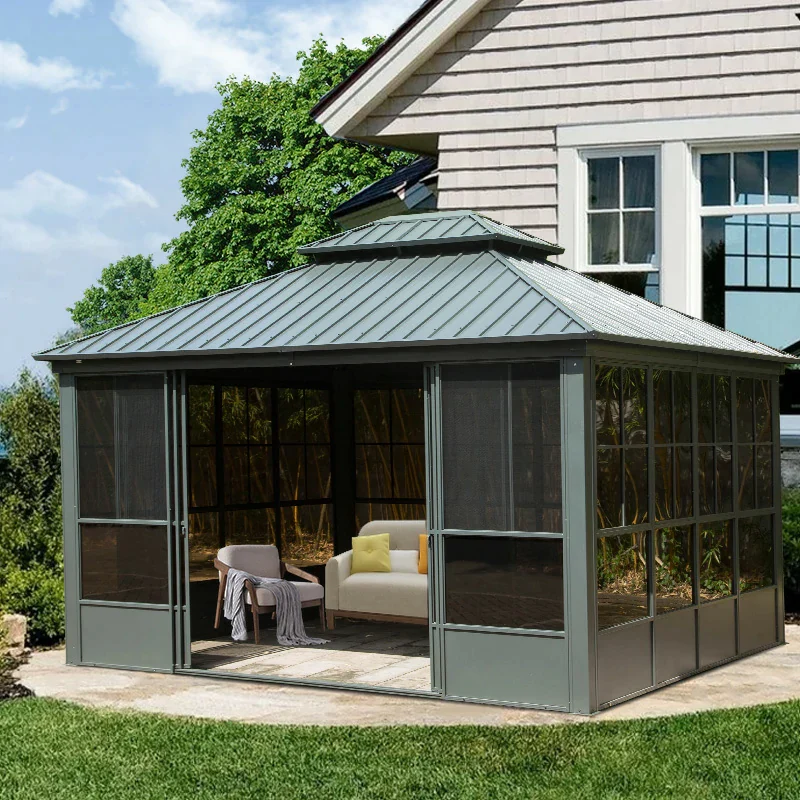
What is a hard top gazebos?
Hard top gazebos are sturdy gazebos made of durable material roofs such as metal or polycarbonate. Ideal for weatherproofing against inclement weather, such as strong winds, rain or snow, they are all-weather gazebos. They are also popular for use in areas where there is a lot of shade, such as around swimming pools or golf courses.
What is a soft top gazebo?
Soft top gazebo features a fabric canopy or roof made of durable materials such as polyester or canvas. This type of gazebo is typically supported by a sturdy metal frame, and its lightweight and portable nature makes it easy to assemble, disassemble, and move around as needed. Perfect for enjoying a relaxing afternoon or evening with friends.

Pros and Cons of Hardtop Gazebos
Advantages of Hardtop Gazebos
Hardtop gazebos are known for their durability and longevity. These structures are constructed with sturdy materials like metal or solid wood, making them highly resistant to wear and tear. They provide a long-lasting outdoor shelter that can withstand various weather conditions, including rain, snow, and intense sunlight.
Additionally, hardtop gazebos offer enhanced stability due to their robust construction. This stability makes them suitable for areas with high winds or frequent storms. Furthermore, their sleek and sophisticated designs add an elegant touch to any outdoor space.
Disadvantages of Hardtop Gazebos
One drawback of hardtop gazebos is their higher cost compared to soft top options. The quality materials and superior craftsmanship contribute to the elevated price point. Moreover, the installation and maintenance of hardtop gazebos can be more challenging and time-consuming, often requiring professional assistance.
Another factor to consider is the limited flexibility and portability of hardtop gazebos. Once installed, they are generally not designed to be moved or disassembled easily. Therefore, if you foresee the need to relocate or adjust your outdoor space frequently, a hardtop gazebo may not be the most suitable choice.

Pros and Cons of Soft Top Gazebos
Advantages of Soft Top Gazebos
Soft top gazebos, also known as canopy gazebos, offer a more affordable alternative to hardtop options. These gazebos feature a fabric or vinyl canopy supported by a lightweight frame, making them less expensive and easier to install.
The versatility and portability of soft top gazebos are significant advantages. They are typically designed for quick and hassle-free assembly, allowing you to set them up and take them down as needed. Furthermore, many soft top gazebos come with adjustable shade options, allowing you to adapt to different sunlight conditions.
Disadvantages of Soft Top Gazebos
Soft top gazebos generally have a shorter lifespan compared to their hardtop counterparts. The canopy material is more susceptible to wear and tear, especially in harsh weather conditions. While they provide some protection from the elements, they are not as durable or weather-resistant as hardtop gazebos.
The stability of soft top gazebos can also be a concern, particularly in windy areas. Their lightweight construction makes them more prone to movement and potential damage during strong winds. Additionally, the design options for soft top gazebos are relatively limited compared to hardtop gazebos, which offer more customization choices.
Factors to Consider When Choosing Between Hardtop and Soft Top Gazebos
When deciding between a hardtop and a soft top gazebo, several factors come into play. It's essential to evaluate your specific needs and preferences to make an informed decision.
- Budget and cost: Consider your budgetary constraints and determine the maximum amount you're willing to invest in a gazebo.
- Climate and weather conditions: Assess the typical weather patterns in your area, including wind, rain, snow, and intense sunlight. Choose a gazebo that can withstand the local climate.
- Intended use and frequency of use: Determine how often you plan to use the gazebo and for what purposes. Will it be primarily for relaxation, outdoor dining, or entertaining guests?
- Installation and maintenance requirements: Consider your DIY skills and the time and effort required for installation and ongoing maintenance. Hardtop gazebos often require professional assistance for proper setup.
- Design preferences and aesthetics: Think about the style and design elements that complement your outdoor space. Hardtop gazebos offer more design options, while soft top gazebos provide simplicity and versatility.

Comparison of Hardtop and Soft Top Gazebos Based on Different Criteria
|
Features |
Hardtop Gazebo |
Soft top Gazebo |
|
Price |
Expensive ($1000-$3000) |
Cheap ($200-$700) |
|
Assembly difficulty |
Difficulties |
Simple |
|
Durability |
Durable |
Non-durable |
|
Sun Protection |
Strong |
High |
|
Wind resistance |
Strong |
Poor |
|
Snow resistance |
Strong |
Poor |
Durability and longevity: Hardtop gazebos are more durable and have a longer lifespan than soft top gazebos due to their robust materials and construction.
- Protection from elements: Hardtop gazebos offer better protection from harsh weather conditions, including rain, snow, and intense sunlight.
- Stability and strength: Hardtop gazebos are generally more stable and can withstand high winds and storms better than soft top gazebos.
- Installation and maintenance: Soft top gazebos are easier to install and maintain compared to hardtop gazebos, which often require professional assistance.
- Portability and flexibility: Soft top gazebos are more portable and can be easily moved or disassembled when needed. Hardtop gazebos are typically fixed structures.
- Aesthetics and design options: Hardtop gazebos provide a wider range of design options, allowing you to match your outdoor space's style and architecture. Soft top gazebos have a simpler and more minimalist design.
Considering that most people purchase outdoor gazebos with the intention of long-term use, hardtop gazebos have better ability to withstand harsh weather conditions, which is why we believe hardtop gazebos are in a leading position in terms of usage.
Choosing the Right Gazebo for Your Needs
When deciding between a soft top gazebo and a hardtop gazebo, it's important to evaluate your specific needs and preferences. If you prioritize easy installation, portability, cost-effectiveness, flexibility, and style, a soft top gazebo is a suitable choice. On the other hand, if longevity, durability, increased shade and privacy are your priorities, a hardtop gazebo would be the better option.
Remember to assess your climate, budget, desired aesthetics, and maintenance capabilities to make an informed decision that aligns with your outdoor living requirements.
FAQs
Which type of gazebo is better for windy areas?
Hardtop gazebos are generally more suitable for windy areas due to their enhanced stability and robust construction.
Can a soft top gazebo withstand heavy rain or snow?
While soft top gazebos offer some protection from rain and snow, they are not as resilient as hardtop gazebos. It's advisable to remove the canopy during heavy precipitation to prevent damage.
Can I install a hardtop gazebo on my own?
Sure, generally, most hardtop gazebos come with an installation manual that provides step-by-step instructions for self-installation. Alternatively, you can hire a professional to install it for you, which can save you time, but may require additional charges.
Can I move a soft top gazebo to a different location easily?
Yes, one of the advantages of soft top gazebos is their portability. They can be easily moved or disassembled for relocation or storage.
Can hardtop gazebos handle snow?
Sure, it's important to pay attention to the specifications provided by the manufacturer for the gazebo, as they will indicate the snow load capacity and other relevant information.
Do they come with privacy curtains and screens?
Currently, most hardtop gazebos available in the market come with privacy curtains and mosquito netting. However, soft top gazebos generally do not include these features.





Leave a comment
This site is protected by hCaptcha and the hCaptcha Privacy Policy and Terms of Service apply.